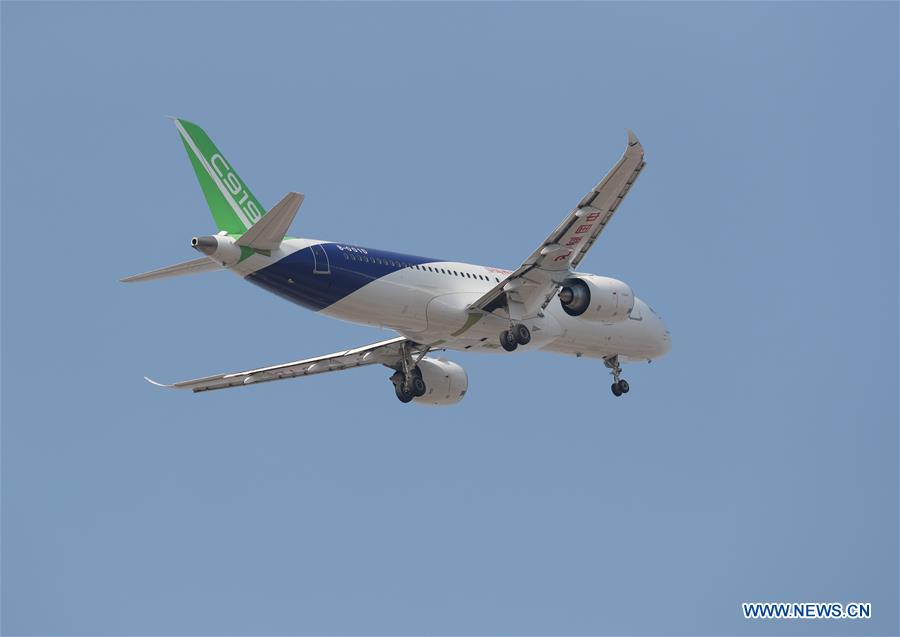

China's aviation industry has benefited from the implementation of a series of tax reduction and fee cut policies, which has promoted the production of more domestically made largest aircraft.
The Hongdu Aviation Industry Company from Jiangxi province in Eastern China is one of the beneficiaries. On May 26, 2009, the Hongdu C919 project was officially established, becoming the only supplier for front fuselage and middle rear fuselage of the domestically made large aircraft C919.

The third C919 prototype passenger jet takes off at Shanghai Pudong International Airport in Shanghai, east China, Dec. 28, 2018. (Xinhua/Ding Ting)
"The tax department attached great importance to it and set up a special mechanism for quick response to tax-related matters and introduced the 'chief liaison officer' system into the group," recalls Rao Guohui, chief accountant of the group, of the aircraft manufacturing process.
The policy dividend brought by tax and fee reduction has continuously promoted the company's scientific and technological innovation.
"In 2019, larger scale tax cuts and fee reductions were implemented. In the first half of the year, in addition to the continuation of the previous preferential tax policies, Hongdu has enjoyed nearly 50 million yuan (about $7.3 million) in high-tech tax incentives such as additional deductions for R&D expenses," Rao said.
Today, the aviation industry has become an important driving force for the growth of Jiangxi province. According to official figures, the total revenue of the province's aviation industry exceeded 100 billion yuan in 2019.
The introduction of various national tax and fee reduction policies in recent years has also brought real benefits to Shanghai Shangfei Aircraft Equipment Manufacturing Company.
"When the company was facing a development bottleneck, various preferential tax policies were like helping hands that reduced the company's tax costs, sped up the capital flow rate, allowed the company to invest more funds in R&D and innovation, and increased the development speed of the enterprise," said Zhou Caihua, the company's financial director.
Since 2016, there has been an accumulated 1.3 million yuan of enterprise income tax reduction for Shangfei. "With a tax bill like this, we feel more confident about the future of our company," Zhou pointed out happily.
"Tax cuts and fee reductions have greatly reduced the burden on the enterprise and enhanced its vitality and market competitiveness," said Yan Feng, executive vice president of the company, adding that thanks to China's tax policies, the development of domestically made aircraft is certain to have a good future.
 Fire brigade in Shanghai holds group wedding
Fire brigade in Shanghai holds group wedding Tourists enjoy ice sculptures in Datan Town, north China
Tourists enjoy ice sculptures in Datan Town, north China Sunset scenery of Dayan Pagoda in Xi'an
Sunset scenery of Dayan Pagoda in Xi'an Tourists have fun at scenic spot in Nanlong Town, NW China
Tourists have fun at scenic spot in Nanlong Town, NW China Harbin attracts tourists by making best use of ice in winter
Harbin attracts tourists by making best use of ice in winter In pics: FIS Alpine Ski Women's World Cup Slalom
In pics: FIS Alpine Ski Women's World Cup Slalom Black-necked cranes rest at reservoir in Lhunzhub County, Lhasa
Black-necked cranes rest at reservoir in Lhunzhub County, Lhasa China's FAST telescope will be available to foreign scientists in April
China's FAST telescope will be available to foreign scientists in April "She power" plays indispensable role in poverty alleviation
"She power" plays indispensable role in poverty alleviation Top 10 world news events of People's Daily in 2020
Top 10 world news events of People's Daily in 2020 Top 10 China news events of People's Daily in 2020
Top 10 China news events of People's Daily in 2020 Top 10 media buzzwords of 2020
Top 10 media buzzwords of 2020 Year-ender:10 major tourism stories of 2020
Year-ender:10 major tourism stories of 2020 No interference in Venezuelan issues
No interference in Venezuelan issues
 Biz prepares for trade spat
Biz prepares for trade spat
 Broadcasting Continent
Broadcasting Continent Australia wins Chinese CEOs as US loses
Australia wins Chinese CEOs as US loses